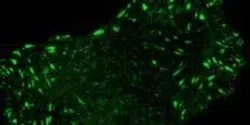Cancer Research

Even the most careful chosen meal can contain surprises. To defend against infectious microbes, viruses or other potential hazards that find their way to the intestines, a dedicated contingent of immune cells keeps watch within the thin layer of tissue that divides the contents of the gut from the body itself.

Researchers with The Cancer Genome Atlas (TCGA) Research Network have completed the largest, most diverse tumor genetic analysis ever conducted, revealing a new approach to classifying cancers. The work, led by researchers at the UNC Lineberger Comprehensive Cancer Center at the University of North Carolina at Chapel Hill and other TCGA sites, not only revamps traditional ideas of how cancers are diagnosed and treated, but could also have a profound impact on the future landscape of drug development.

Substances found in bee, snake and scorpion venom could potentially act as effective anti-tumor agents according to University of Illinois researchers
















